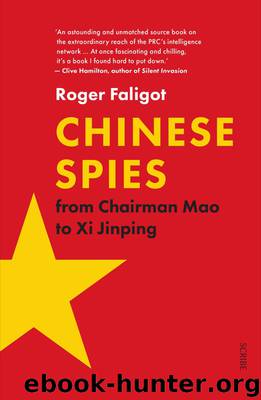Chinese Spies by Roger Faligot

Author:Roger Faligot
Language: eng
Format: epub, mobi
Tags: HIS008000, POL011000, POL035000, POL062000, POL036000, POL066000
Publisher: Scribe Publications Pty Ltd
Published: 2019-07-15T16:00:00+00:00
8
CHINA AND RUSSIA VS AMERICA
Just before midnight on 7 May 1999, the US conducted a series of test strikes on real targets using JDAM precision-guided missiles,1 guided by GPS. Since 24 March, NATO had been bombing Belgrade—its first offensive in half a century of existence. The pretext was aiding the province of Kosovo in its defence against the Serbs, and supporting its separatist paramilitary organization, the Kosovo Liberation Army.
Three of the five missiles dropped by B-2 bombers hit the Chinese embassy, in the Neo Beograd municipality. In the smoking rubble, about thirty Chinese lay wounded. Three people were killed; they were, officially, journalists reporting on the war between NATO and Serbian forces: Shao Yunhuan, 48, attached to the Xinhua News Agency, and Xu Xinghu, 29, and his wife Zhu Ying, 27, both correspondents for Enlightenment Daily (Guangming Ribao).
There was no doubt that the attack was in violation of international law. During the hours that followed, a decade after the massacre of students calling for democracy, demonstrations were held in Tiananmen Square. People carried placards with reproductions of Guernica, Picasso’s famous painting depicting the Nazi aerial bombardment of the Basque city during the Spanish Civil War, and slogans like “Down with American imperialism!” or “No, Clinton, we are not Monica!” A year on from the Lewinsky scandal, its shadow still hung over American politics.
In the White House, Clinton himself, overwhelmed by the escalating conflict, tried to reach President Jiang, who was refusing to take his calls and demanding a public apology. Was it really true that a certain Dr Folamour in the Pentagon had authorized the airstrike without the president’s knowledge? In his memoirs, Clinton reiterated the official explanation: that the CIA had inadvertently used an out-of-date map of Belgrade, which showed the embassy as an old Serbian building used for military purposes. The embassy building, finished only three years earlier, appeared to have been rather easily overlooked.
A week passed. On 14 May, the US president finally managed to talk to Jiang Zemin: “I apologized again and told him I was sure he didn’t believe I would knowingly attack his embassy. Jiang replied that he knew I wouldn’t do that, but said he did believe that there were people in the Pentagon or the CIA who didn’t favor my outreach to China and could have rigged the maps intentionally to cause a rift between us. Jiang had a hard time believing that a nation as technologically advanced as we were could make such a mistake. I had a hard time believing it, too, but that’s what happened.”2
It was a humiliating situation for Jiang Zemin. He had done everything he could to maintain a cordial relationship with the White House since Clinton had become president in 1993, including welcoming him on a state visit to China the previous year. In the upper echelons of the PLA, Jiang had come under a great deal of criticism for this stance. Now, Zhang Wannian, vice-chairman of the Central Military Commission, was expressing concerns—shared by several other generals—about Zhongnanhai’s soft response to what had happened in Kosovo.
Download
This site does not store any files on its server. We only index and link to content provided by other sites. Please contact the content providers to delete copyright contents if any and email us, we'll remove relevant links or contents immediately.
| Arms Control | Diplomacy |
| Security | Trades & Tariffs |
| Treaties | African |
| Asian | Australian & Oceanian |
| Canadian | Caribbean & Latin American |
| European | Middle Eastern |
| Russian & Former Soviet Union |
The Secret History by Donna Tartt(18967)
The Social Justice Warrior Handbook by Lisa De Pasquale(12171)
Thirteen Reasons Why by Jay Asher(8856)
This Is How You Lose Her by Junot Diaz(6844)
Weapons of Math Destruction by Cathy O'Neil(6223)
Zero to One by Peter Thiel(5742)
Beartown by Fredrik Backman(5690)
The Myth of the Strong Leader by Archie Brown(5473)
The Fire Next Time by James Baldwin(5393)
How Democracies Die by Steven Levitsky & Daniel Ziblatt(5181)
Promise Me, Dad by Joe Biden(5120)
Stone's Rules by Roger Stone(5059)
A Higher Loyalty: Truth, Lies, and Leadership by James Comey(4919)
100 Deadly Skills by Clint Emerson(4888)
Rise and Kill First by Ronen Bergman(4744)
Secrecy World by Jake Bernstein(4709)
The David Icke Guide to the Global Conspiracy (and how to end it) by David Icke(4664)
The Farm by Tom Rob Smith(4475)
The Doomsday Machine by Daniel Ellsberg(4462)
